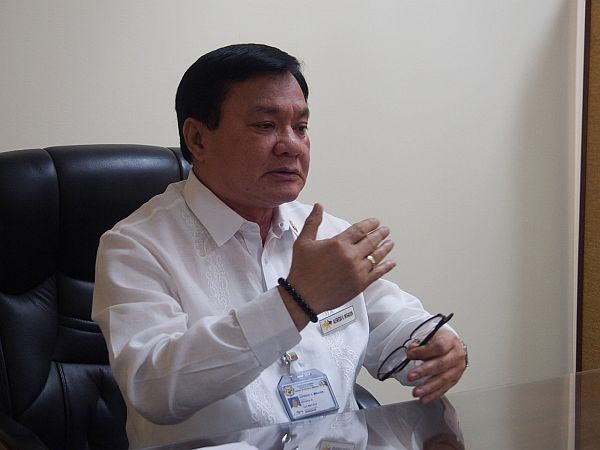BIR to ease tax registration process, attract underground economy in CV

Alfredo V. Misajon, the newly appointed director of the Bureau of Internal Revenue in Central Visayas (BIR-13), promises a more streamlined business tax registration process for the region’s taxpayers.
CDN PHOTO/CHRISTIAN MANINGO
A different approach in tax administration was seen by the Bureau of Internal Revenue in Central Visayas (BIR-13) as the “trick” to attain its collection goals this year.
Newly appointed BIR-13 chief Alfredo Misajon voiced his optimism on achieving their target this year, adding that a shift in priorities was needed to make this possible.
“By and large, in the past, BIR’s approach has been enforcement-centric. We did a lot of investigation and shutdowns. This year, we will try to ease the burden of taxpayers and do different things,” he told reporters on Thursday.
This year, he said BIR will focus on making it easier for businesses to transact with them by streamlining processes involved in registration and getting tax clearances.
“It will no longer be burdensome to taxpayers and it will attract those in the underground economy to come out in the open and register with us. That is one way of expanding our taxpayer base,” he said.
As of June last year, there have been 705,701 registered taxpayers under BIR 13, including domestic corporations, individual payers, as well as resident and non-resident foreign corporations.
The BIR earlier introduced the Electronic Filing and Payment System (EFPS), which allows taxpayers to pay their taxes online in the comfort of their home or office, even beyond banking hours.
In terms of enforcement, Misajon said they will now be more selective in determining which taxpayers to investigate.
Unlike before when they looked into the tax payment practices of “everyone,” they will concentrate more on those paying below the BIR benchmark starting this year.
While the BIR national office has yet to assign targets to revenue regions, Misajon said that he expects the target for Cebu to grow by 20 percent.
BIR-13 collected P26.6 billion in 2016, up from P25.9 billion in 2015, but way below its target of P36 billion for the year.
Based on Misajon’s projections, BIR-13’s target for 2017 was seen to grow to around P43.2 billion.
Last year, none of the revenue regions in the country hit their targets.
Nonetheless, Misajon said they will still work hard to achieve their goals for this year especially since the BIR was expected to assign more “doable and realistic” figures.
Misajon said he sees Cebu as a sweet spot in the region and a huge revenue potential in the province.
His prospects are anchored on Cebu’s young population, booming business, and high purchasing power among those living here.
While business may be thriving in Cebu, most of the players here don’t pay taxes to BIR-13 but to other revenue regions where their mother offices are registered.
Misajon said he was banking on more local players to register with BIR-13 and hoped the agency’s streamlined processes will encourage more investors to do business in Cebu.
“I have a deep appreciation for the Cebuanos. Revenue region 13, under the last administration, made really good effort,” he said, citing that Cebu was the fastest growing revenue region in the country in terms of collection for three years.
Misajon was director of BIR Quezon City revenue region for more than two years before his appointment to Cebu, replacing Hermeno Palamine, who was transferred to Cagayan de Oro City.
Palamine served in BIR-13 for about five years before he was replaced.
The new BIR-13 chief holds more than three decades of experience in government, beginning as a revenue reviewer in his hometown province of Iloilo and rising up the ranks through the years.
He said he also previously headed a Revenue District Office (RDO) under BIR-13, although he did not elaborate.
He formally took over as chief of BIR-13 last Jan. 30, following a nationwide reshuffling of revenue region directors.
Disclaimer: The comments uploaded on this site do not necessarily represent or reflect the views of management and owner of Cebudailynews. We reserve the right to exclude comments that we deem to be inconsistent with our editorial standards.
